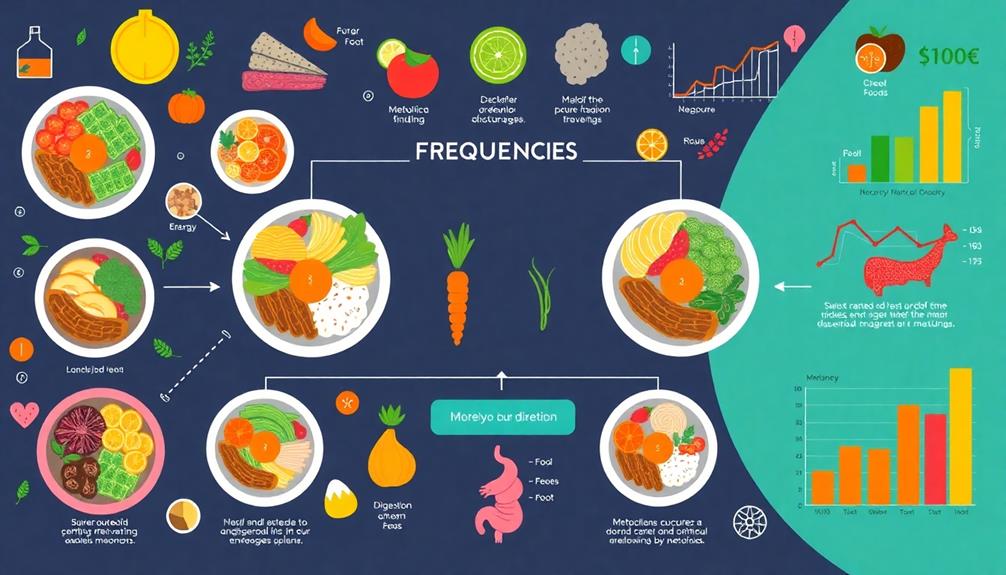The frequency of your meals can dramatically impact your metabolism and overall health. Eating four or more meals daily helps stabilize blood sugar, improve cholesterol levels, and reduce obesity risk. It enhances appetite control and supports metabolic functions by regulating gut hormones and aligning with your body's circadian rhythms. Regular meal patterns, especially breakfast, are essential for maintaining metabolic balance. While some might thrive on fewer meals, more frequent eating generally promotes better health outcomes. Explore how adjusting your meal schedule could further optimize your metabolism and improve your wellness.
Key Takeaways
- Higher meal frequency (four or more meals daily) improves glycemic control and lowers total and LDL cholesterol levels.
- Frequent meals help maintain stable blood sugar levels, reducing the risk of obesity and enhancing appetite regulation.
- Regular meal patterns align with circadian rhythms, optimizing metabolic processes and promoting better health outcomes.
- Time-restricted feeding can improve glucose control and metabolic health without calorie restriction, benefiting insulin sensitivity.
- Consistent meal timing reinforces healthy eating patterns, preventing the negative metabolic effects of skipping meals or irregular eating.
Understanding Meal Frequency

Understanding meal frequency is essential for optimizing your metabolism and overall health. Research shows that consuming four or more meals daily can lead to lower total and LDL cholesterol levels, along with reduced waist circumference.
In contrast, eating fewer than three meals may contribute to obesity. By adopting higher meal frequency, you can enhance appetite control and improve metabolic health. For example, incorporating nutritious meals like Mushroom Masala can provide essential vitamins and minerals while helping to maintain a balanced diet.
Regular meal patterns, especially including breakfast, offer significant physiological benefits. They help maintain metabolic control and reduce inflammation, which is vital for preventing chronic diseases.
However, be mindful of your meal timing; late-night eating is linked to higher obesity rates and an increased risk of coronary heart disease.
It's not just about caloric intake—how often you eat matters too. Studies suggest that eating more than six meals a day can decrease obesity risk, highlighting the importance of frequent eating patterns.
Effects on Weight Management

When it comes to weight management, meal frequency plays a vital role in how you regulate appetite and control hunger.
You might find that eating more often can help maintain stable blood sugar levels, reducing the risk of obesity.
Additionally, planning meals around your favorite dishes, such as a delicious Turkey Sandwich for leftovers, can make it easier to stick to a healthy eating routine.
However, the relationship between meal frequency and weight isn't straightforward, and it often varies from person to person.
Meal Frequency and Obesity
Eating more frequently can greatly impact your weight management efforts. Research shows that consuming four or more meals per day correlates with a lower risk of obesity. In contrast, sticking to just one or two meals might lead to increased body weight and waist circumference. You can see the effects of meal frequency on various aspects of health in the table below:
| Meal Frequency | Effects |
|---|---|
| 1-2 meals per day | Higher body weight, increased waist circumference |
| 3 meals per day | Moderate body weight, stable waist circumference |
| 4+ meals per day | Lower obesity risk, better metabolic health |
| Longer fasting periods | Lower body mass index (BMI) |
| Frequent eating | Lower total and LDL cholesterol levels |
Observational studies suggest that a higher meal frequency may enhance metabolic health and support effective weight management. Additionally, longer overnight fasting periods can contribute to a lower BMI. By adjusting your dietary pattern to include more frequent meals, you may improve not only your energy intake but also your overall health and weight management.
Appetite Regulation Mechanisms
Meal frequency plays a significant role in appetite regulation, impacting how you manage your weight. When you eat more frequently, typically four or more meals a day, you're likely to experience improved appetite control. This means lower hunger ratings and higher satiety, which can support your weight management goals.
Additionally, incorporating traditional Brazilian dishes rich in flavors may enhance meal satisfaction and encourage healthier eating patterns.
Here are a few key points to keep in mind:
- Higher meal frequency may stabilize glucose levels and enhance insulin sensitivity.
- Regular meal timing influences gut hormones, which regulate satiety signals.
- A lower frequency eating pattern can lead to increased metabolic rate and protein oxidation.
- Dietary patterns that emphasize frequent meals can mitigate weight gain.
Additionally, research indicates that fluctuations in glucose and insulin are more pronounced with lower meal frequencies, leading to greater hunger.
While systematic reviews show no significant weight change differences between high and low meal frequencies, it's important to acknowledge that meal composition and timing are vital for effective appetite control.
Glycemic Control Benefits
Although many factors influence weight management, glycemic control stands out as an essential element that can be greatly affected by meal frequency. When you increase your meal frequency to four or more meals per day, you're likely to experience improved glycemic control. This can lead to lower total and LDL cholesterol levels, reducing your obesity risk considerably.
In contrast, sticking to three meals a day often results in greater fluctuations in glucose and insulin levels, indicating less stable glycemic control. Incorporating regular meal patterns, especially breakfast consumption, contributes to better metabolic control.
For instance, enjoying nutritious dishes like Nettle and Potato Soup can help you start your day with essential vitamins and minerals. Consistent breakfast eaters tend to have a lower risk of weight gain than those who skip meals.
Notably, some studies suggest that restricting eating to just two meals a day can still promote weight loss, with participants losing an average of 1.02 kg compared to those eating three meals.
Meal Timing Considerations

When considering your daily routine, the timing of your meals can greatly impact your metabolic health. Regular meal patterns, especially having breakfast consistently, enhance metabolic control and help prevent weight gain.
For instance, enjoying a balanced breakfast featuring wholesome ingredients can mirror the richness of Italian cuisine, where dishes like pasta with tomato sauce are often complemented by fresh, nutritious elements.
On the other hand, irregular meal timing can disrupt your circadian rhythms, leading to obesity and poorer glucose tolerance. Late-night eating considerably increases the risk of chronic diseases, including a 55% higher risk for coronary heart disease (CHD). Moreover, inconsistent meal patterns can negatively affect digestion and metabolism, further exacerbating the risk of metabolic disorders. To counteract these effects, adopting mindful eating habits, such as consuming meals at consistent times, can help synchronize the body’s internal clock. Additionally, eating seasonally benefits the body by providing nutrient-dense, fresh, and diverse foods that align with natural cycles, promoting overall health and vitality.
To optimize your meal timing and support overall health, keep these points in mind:
- Consistent Meal Patterns: Regular meals help stabilize energy intake and improve metabolic control.
- Calorie Distribution: Spreading your calories evenly throughout the day can aid in weight loss and appetite management.
- Avoid Late-Night Eating: Try to finish your meals earlier to align with your body's natural rhythms.
- Focus on Breakfast: Starting your day with a nutritious breakfast can set the tone for better metabolic health.
Metabolic Health Implications

When you consider meal frequency, it's essential to understand how it impacts your metabolic health.
Eating more frequently can help regulate your appetite and keep cholesterol levels in check.
Additionally, incorporating diverse culinary traditions, such as Asian Cuisine, can introduce a variety of flavors and nutrients that support overall health.
Meal Frequency Effects
Research shows that meal frequency can greatly impact your metabolic health. The way you space out your meals can influence various factors such as weight management, insulin sensitivity, and overall health outcomes. Higher meal frequency, typically defined as four or more meals a day, is associated with lower LDL cholesterol levels, reduced obesity risk, and improved glycemic control compared to fewer meals.
Additionally, incorporating diverse cuisines, such as traditional dishes like Muamba De Galinha, can provide nutritional benefits that support metabolic health.
Consider these key points about meal frequency effects:
- Eating more frequently can enhance insulin sensitivity and lower total caloric intake.
- Regular meal patterns, including breakfast, support better circadian rhythms and lower inflammation.
- Studies suggest that limiting meals to two per day may lead to greater reductions in body weight and waist circumference.
- Time-restricted feeding, where you eat within a 6-8 hour window, can also benefit metabolic health.
Appetite Regulation Mechanisms
Understanding appetite regulation mechanisms is essential for optimizing metabolic health. When you increase meal frequency to four or more meals per day, you often experience improved appetite regulation, which can lead to lower hunger ratings and higher satiety levels. For instance, dishes like Chinese Steamed Egg can be a light yet satisfying option that helps maintain balanced nutrition.
In contrast, eating just three meals a day might stabilize glucose levels and reduce insulin fluctuations, enhancing metabolic control. However, this can also decrease your overall caloric intake, which mightn't always be beneficial depending on your goals.
Meal timing plays a significant role too. Late-night eating often results in poorer appetite regulation, increasing caloric intake and raising the risk of weight gain. Disrupting your regular meal patterns can impair satiety signaling, making it harder to recognize when you're full. This can lead to excessive eating and further weight gain.
Moreover, lower meal frequency has been linked to increased protein oxidation and a higher resting metabolic rate (RMR), affecting energy expenditure. As a result, finding the right balance in meal frequency and timing is essential.
Time-Restricted Feeding Benefits

Time-restricted feeding (TRF) offers a range of benefits that can greatly enhance your metabolic health. By limiting your eating to a 6-8 hour window, you can experience improvements in insulin sensitivity and better glucose control, which are essential for effective weight management.
Many studies show that TRF can lead to reductions in both body weight and fat mass without the need for calorie restriction. Incorporating a variety of nutrient-dense foods, such as those found in Ethiopian cuisine, can further support metabolic health and provide essential vitamins and minerals.
Here are some key benefits of TRF:
- Enhanced metabolic health: Improved insulin sensitivity and glucose regulation.
- Weight management: Reductions in body weight and fat mass.
- Optimized energy expenditure: Better alignment with circadian rhythms boosts energy utilization.
- Improved hormonal responses: Lower ghrelin levels and increased satiety hormones support appetite regulation.
Moreover, TRF promotes mechanisms like autophagy and stress resistance, which can reduce inflammation and enhance cardiovascular health.
Appetite Regulation Dynamics

When it comes to appetite regulation, meal frequency plays an essential role in how you feel throughout the day. Research shows that eating fewer meals—around three per day—can enhance your satiety and lower hunger ratings, which aids in appetite control.
In contrast, those who eat more frequently, like 14 meals a day, may experience increased insulin levels. Elevated insulin can stimulate your appetite, making it easier to overeat. For instance, indulging in a hearty dish like a loaded baked potato can lead to temporary satisfaction, but frequent consumption may disrupt your hunger signals.
A lower meal frequency is also linked to improved postprandial glucose levels, which can enhance your metabolic responses and help regulate hunger. You might find that by eating fewer meals, you're more in tune with your body's needs, leading to less frequent cravings.
Additionally, increased protein oxidation in those consuming fewer meals suggests that your body may adapt more effectively to these patterns, optimizing energy use throughout the day.
Regular meal timing, particularly starting your day with breakfast, further supports appetite control and reduces the risk of weight gain.
Meal Frequency and Microbiota

Eating patterns greatly influence your gut microbiota, which plays an essential role in your overall metabolic health. The frequency of your meals can considerably affect the composition of your gut bacteria, and regular meal patterns are linked to a more diverse and balanced microbiome.
This diversity is vital for maintaining metabolic health and can help mitigate issues like obesity and insulin resistance.
Here are some key points to keep in mind:
- Higher meal frequencies can enhance microbial diversity, improving gut health.
- Regular eating patterns align your gut microbiota with circadian rhythms, optimizing energy metabolism.
- Disrupted eating schedules and late-night meals may lead to imbalances in gut microbiota, exacerbating inflammation.
- Beneficial gut bacteria thrive with increased meal frequency, aiding in fiber fermentation and short-chain fatty acid production, which regulate inflammation.
Research Findings Overview

Research in meal frequency reveals significant impacts on metabolic health, suggesting that how often you eat can shape your body's biochemical responses.
Studies indicate that higher meal frequency, defined as four or more meals per day, is linked to lower total and LDL cholesterol levels, thereby reducing obesity risk. In contrast, participants consuming only three meals a day showed greater fluctuations in glucose and insulin levels compared to those eating up to 14 meals daily. This variability can affect hunger and satiety signals, influencing dietary patterns.
Moreover, time-restricted feeding—eating within a 6 to 8-hour window—has demonstrated health benefits, particularly in improving glucose control and other metabolic outcomes.
A systematic review highlighted that consuming just two meals per day may lead to more significant reductions in body weight and waist circumference than three or six meals. Regular meal patterns also help align with your body's circadian rhythms, optimizing metabolic processes like glucose tolerance, which tends to be poorer in the evening.
Practical Recommendations for Eating

Understanding the importance of meal frequency opens the door to practical strategies for enhancing your metabolic health. To optimize your weight management and improve insulin sensitivity, consider the following recommendations:
- Aim for 5-6 meals per day to support appetite control and reduce obesity risk.
- Prioritize breakfast consumption, as it's linked to better metabolic control and lower inflammation.
- Experiment with time-restricted feeding by limiting your meals to a 6-8 hour window, which can improve glycemic control and metabolism.
- Maintain consistent meal timing to reinforce healthy eating patterns and prevent the negative effects of skipping meals.
Frequently Asked Questions
Does Frequency of Eating Affect Metabolism?
Eating frequency can impact your metabolism, but the effects vary. You might find that more meals help with appetite control and energy levels, while fewer meals could improve your glycemic control and stability.
Is It Better to Eat 2 or 3 Meals a Day?
When you consider whether to eat two or three meals a day, think about your lifestyle and hunger cues. Many find two meals beneficial for weight management, but it's crucial to listen to your body's needs.
Is It Better to Eat 3 Meals or 5 Small Meals?
It's often better to eat 5 small meals instead of 3 larger ones. This can help stabilize your energy levels, control hunger, and maintain steady glucose levels throughout the day, making you feel more satisfied.
How Does Food Frequency Affect the Body?
Food frequency affects your body's metabolism, appetite, and energy levels. Eating more often can help regulate hunger and improve nutrient absorption, while fewer meals might leave you feeling hungrier and less satisfied throughout the day.
Conclusion
In the grand scheme of health, meal frequency plays a pivotal role in your metabolism and overall well-being. By understanding how often you eat and when, you can fine-tune your approach to weight management and metabolic health. Remember, it's not just about what you eat, but also how you space it out. So, don't put all your eggs in one basket; experiment with your meal timing and frequency to find what works best for you.










